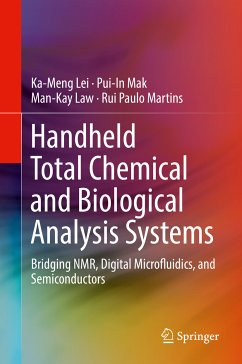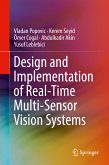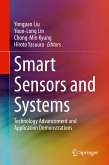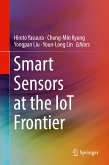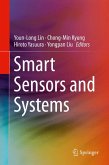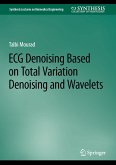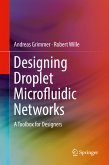Handheld Total Chemical and Biological Analysis Systems (eBook, PDF)
Bridging NMR, Digital Microfluidics, and Semiconductors
Handheld Total Chemical and Biological Analysis Systems (eBook, PDF)
Bridging NMR, Digital Microfluidics, and Semiconductors
- Format: PDF
- Merkliste
- Auf die Merkliste
- Bewerten Bewerten
- Teilen
- Produkt teilen
- Produkterinnerung
- Produkterinnerung

Hier können Sie sich einloggen

Bitte loggen Sie sich zunächst in Ihr Kundenkonto ein oder registrieren Sie sich bei bücher.de, um das eBook-Abo tolino select nutzen zu können.
The book Handheld Total Chemical and Biological Analysis Systems: Bridging NMR, Digital Microfluidics, and Semiconductorscenters on the complete design of Nuclear Magnetic Resonance (NMR) microsystems for in vitro chemical and biological assays based on semiconductor chips and portable magnet. Different sensing mechanisms for CMOS in vitro assay are compared, key design criteria of the CMOS transceiver for NMR measurement are revealed, and system-level optimizations of the CMOS NMR platform utilizing digital microfluidic and diverse functions of the CMOS technology are discussed. Two CMOS NMR…mehr
- Geräte: PC
- ohne Kopierschutz
- eBook Hilfe
- Größe: 7.07MB
![Design and Implementation of Real-Time Multi-Sensor Vision Systems (eBook, PDF) Design and Implementation of Real-Time Multi-Sensor Vision Systems (eBook, PDF)]() Vladan PopovicDesign and Implementation of Real-Time Multi-Sensor Vision Systems (eBook, PDF)73,95 €
Vladan PopovicDesign and Implementation of Real-Time Multi-Sensor Vision Systems (eBook, PDF)73,95 €![Smart Sensors and Systems (eBook, PDF) Smart Sensors and Systems (eBook, PDF)]() Smart Sensors and Systems (eBook, PDF)65,95 €
Smart Sensors and Systems (eBook, PDF)65,95 €![Smart Sensors at the IoT Frontier (eBook, PDF) Smart Sensors at the IoT Frontier (eBook, PDF)]() Smart Sensors at the IoT Frontier (eBook, PDF)73,95 €
Smart Sensors at the IoT Frontier (eBook, PDF)73,95 €![Smart Sensors and Systems (eBook, PDF) Smart Sensors and Systems (eBook, PDF)]() Smart Sensors and Systems (eBook, PDF)73,95 €
Smart Sensors and Systems (eBook, PDF)73,95 €![ECG Denoising Based on Total Variation Denoising and Wavelets (eBook, PDF) ECG Denoising Based on Total Variation Denoising and Wavelets (eBook, PDF)]() Talbi MouradECG Denoising Based on Total Variation Denoising and Wavelets (eBook, PDF)65,95 €
Talbi MouradECG Denoising Based on Total Variation Denoising and Wavelets (eBook, PDF)65,95 €![Low Power Active Electrode ICs for Wearable EEG Acquisition (eBook, PDF) Low Power Active Electrode ICs for Wearable EEG Acquisition (eBook, PDF)]() Jiawei XuLow Power Active Electrode ICs for Wearable EEG Acquisition (eBook, PDF)70,95 €
Jiawei XuLow Power Active Electrode ICs for Wearable EEG Acquisition (eBook, PDF)70,95 €![Designing Droplet Microfluidic Networks (eBook, PDF) Designing Droplet Microfluidic Networks (eBook, PDF)]() Andreas GrimmerDesigning Droplet Microfluidic Networks (eBook, PDF)73,95 €
Andreas GrimmerDesigning Droplet Microfluidic Networks (eBook, PDF)73,95 €-
-
-
- Shows literature review about state-of-the-art CMOS in vitro diagnosis systems and their sensing mechanisms;
- Shows brief physics background on biological sensing with NMR;
- Shows detailed design of the CMOS transceiver for NMR experiments;
- Describes the first CMOS NMR platform integrated with digital microfluidic devices for electronic-automated sample management;
- Demonstrates magnetic field stabilization for the portable magnet to enhance the robustness of the NMR platform with the aid of CMOS vertical Hall sensor.
Dieser Download kann aus rechtlichen Gründen nur mit Rechnungsadresse in A, B, BG, CY, CZ, D, DK, EW, E, FIN, F, GR, HR, H, IRL, I, LT, L, LR, M, NL, PL, P, R, S, SLO, SK ausgeliefert werden.
- Produktdetails
- Verlag: Springer Nature Switzerland
- Seitenzahl: 102
- Erscheinungstermin: 12. Oktober 2017
- Englisch
- ISBN-13: 9783319678252
- Artikelnr.: 52943201
- Verlag: Springer Nature Switzerland
- Seitenzahl: 102
- Erscheinungstermin: 12. Oktober 2017
- Englisch
- ISBN-13: 9783319678252
- Artikelnr.: 52943201
Dr. Lei worked as a trainee at Evatronix IP, Gliwice, Poland in the summer of 2012. He was a research assistant in SKL-AMSV to work on CMOS micro-NMR biosensor, and will continue the development of it with the Harvard University.
He has published 13 referred papers (6 in scientific journals & 7 in conference proceedings) as well as 2 US patents. His research interests include sensors and analog front-end interfaces, analog circuit techniques for micro-NMR, intelligent digital microfluidics platform, and multidisciplinary design of biomedical devices.
Dr. Lei (co-)received the Chipidea Microelectronics Prize (Bachelor level) 2012; Best Paper Award in Asia Symposium on Quality Electronic Design 2013; Student/Young Researcher Grant from The Chemical and Biological Microsystems Society 2015; Distinguished Design Award of the Student Design Contest in IEEE Asian Solid-State Circuits Conference 2015; Silkroad Award in IEEE International Solid-State Circuits Conference 2016; and the IEEE Solid-State Society Predoctoral Achievement Award in 2017.
Pui-In Mak (Elvis) (S'00-M'08-SM'11) received the B.Sc. ('03) and Ph.D. ('06) degrees from the University of Macau (UM), where he is currently Full Professor at the Faculty of Science and Technology - ECE; Associate Director (Research) and Research Line Coordinator (Wireless and Biomedical) at the State-Key Laboratory of Analog and Mixed-Signal VLSI.
He held a visiting position at the University of Cambridge, UK ('09), INESC-ID, Portugal ('09) and University of Pavia, Italy ('10). His research focuses are on circuits and systems for wireless and multidisciplinary innovations.
Prof. Mak has published 90+ journal and 120+ conference papers, and holds 20+ US patents (issued/filed). He co-authored a number of books/book chapters: Analog-Baseband Architectures and Circuits for Multistandard and Low-Voltage Wireless Transceivers (Springer'07), High-/Mixed-Voltage Analog and RF Circuit Techniques for Nanoscale CMOS (Springer'12) and Ultra-Low-Power and Ultra-Low-Cost Short-Range Wireless Receivers in Nanoscale CMOS (Springer'16), and Enabling the Internet of Things - from Integrated Circuits to Integrated Systems (Springer'17).
He is/was the Editorial Board Member of IEEE Press ('14-'16); Senior/Guest Editor of IEEE Journal on Emerging and Selected Topics in Circuits and Systems ('14-'15, '17); Associate Editor of IEEE Transactions on Circuits and Systems I ('10-'11, '14-'15), IEEE Transactions on Circuits and Systems II ('10-'11, 12'-'13), IEEE CASS Newsletter ('10-), IEEE Potentials ('12-'14), and Elsevier the VLSI Journal - Integration (16'-); Guest Editor of IEEE RFIC Virtual Journal ('14) and IEEE Journal of Solid-State Circuits ('18).
He is/was the Distinguished Lecturer of IEEE Circuits and Systems Society ('14-'15) and IEEE Solid-State Circuits Society ('17-'18). He is/was with the Board-of-Governor ('09-'11) of the IEEE Circuits and Systems Society (CASS), and its Publication Committee ('09-'11), CASCOM ('08-) and CASEO ('09-) Technical Committees. He was the TPC Vice Chair of ASP-DAC ('16), Special/GOLD Session Chair of ISCAS ('09'10'15) and Publicity/Tutorial Chair of APCCAS ('08'12).
He is/was the TP C Member of ISSCC ('16-), ESSCIRC ('16-) and A-SSCC('13-'16).
He (co)-received a number of paper awards in ISSCC'16, A-SSCC'15, ASQED'13, APCCAS'08, DAC/ISSCC'05 and MWSCAS'04. He also (co)-received the IEEE CEDA Outstanding Service Award'17; IEEE CASS Outstanding Young Author Award'10; IEEE CASS Chapter-of-the-Year Award'09; IEEE MGA GOLD Achievement Award'09 and Best Associate Editor of IEEE Transactions on Circuits and Systems II'12-'13. His students honored 3 times the IEEE SSCS Predoctoral Achievement Awards'14'15'17.
Prof. Mak was decorated Honorary Title of Value'05 for scientific merits from the Macau Government. He co-received the Macau's first National Scientific and Technological Progress Award'11 from the China Government, and 3 times the Macau Science andTechnology Invention Awards '12'14'16 from the Macau Government. He was honored the Research Excellence Award'10, Academic staff Award'11 and 10-Year Long Service Award'17 from the University of Macau.
Man-Kay Law (M'11-SM'16) received the B.Sc. degree in Computer Engineering and the PhD degree in Electronic and Computer Engineering from Hong Kong University of Science and Technology (HKUST), in 2006 and 2011, respectively. He joined HKUST as a Visiting Assistant Professor in 2011, and is currently an Associate Professor with the State Key Laboratory of Analog and Mixed-Signal VLSI, Faculty of Science and Technology, University of Macau, Macao.
Dr. Law's research interests are on the development of ultra-low power sensing circuits and integrated energy harvesting techniques for wireless and biomedical applications.
He developed an ultra-low power fully integrated CMOS temperature sensing passive UHF RFID tag together with Zhejiang Advanced Manufacturing Institute (ZAMI) and HKUST.
He has authored and co-authored over 70 technical journals and conference papers and holds 5 U.S. patents.
Dr. Law is/has been a member of the Technical Program Committee of Asia Symposium on Quality Electronic Design 2012-2013, the Review Committee Member of IEEE International Symposium on Circuits and Systems 2012-2015, Biomedical Circuits and Systems Conference 2012-2015, International Symposium on Integrated Circuits 2014, and the University Design Contest Co-Chair of Asia and South Pacific Design Automation Conference 2016.
He was a co-recipient of the ASQED Best Paper Award (2013), A-SSCC Distinguished Design Award (2015) and ASPDAC Best Design Award (2016). He also received the Macao Science and Technology Invention Award (2nd Class) by Macau Government - FDCT(2014). He currently serves as a member in the ISSCC Technical Programme Committee, and the IEEE CAS committee on Sensory Systems as well as Biomedical Circuits and Systems.
Rui P. Martins (IEEE Member'88- Senior Member'99 -Fellow'08), born in April 30, 1957, received the Bachelor (5-years), the Masters, and the Ph.D. degrees, as well as the Habilitation for Full-Professor in electrical engineering and computers from the Department of Electrical and Computer Engineering, Instituto Superior Técnico (IST), TU of Lisbon, Portugal, in 1980, 1985, 1992 and 2001, respectively. He has been with the Department of Electrical and Computer Engineering (DECE) / IST, TU of Lisbon, since October 1980.
Since 1992, he has been on leave from IST, TU of Lisbon (now University of Lisbon since 2013), and is also with the Department of Electrical and Computer Engineering, Faculty of Science and Technology (FST), University of Macau(UM), Macao, China, where he is currently a Chair-Professor since August 2013. In FST he was the Dean of the Faculty from 1994 to 1997 and he has been Vice-Rector of the University of Macau since 1997.
From September 2008, after the reform of the UM Charter, he was nominated after open international recruitment, and reappointed (in 2013), as Vice-Rector (Research) until August 31, 2018. Within the scope of his teaching and research activities he has taught 21 bachelor and master courses and, in UM, has supervised (or co-supervised) 40 theses, Ph.D. (19) and Masters (21). Co-authored: 6 books and 12 book chapters; 25 Patents, USA (23) & Taiwan (2); 400 papers, in scientific journals (126) and in conference proceedings (274); as well as other 62 academic works, in a total of 505 publications. He was a co-founder of Chipidea Microelectronics (Macao) [now Synopsys] in 2001/2002, and created in 2003 the Analog and Mixed-Signal VLSI Research Laboratory of UM,elevated in January 2011 to State Key Laboratory of China (the 1st in Engineering in Macao), being its Founding Director.
